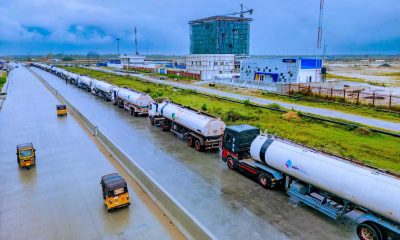
News
Nigerian Economic Crisis: Labour Urge Tinubu to Reverse Naira Float Policy

iexclusivenews – The Nigerian economic crisis deepens as organized labor groups call for immediate policy reversals from President Bola Tinubu’s administration, highlighting the mounting pressure from citizens struggling with unprecedented living costs and economic instability.
Nigerian Economic Crisis Sparks Nationwide Concern
During a significant gathering in Ibadan, Oyo State, the National Union of Shop and Distributive Employees (NUSDE) voiced urgent concerns over the deteriorating economic conditions affecting millions of Nigerians.

The union’s leadership emphasized the critical need for immediate government intervention to address the escalating crisis.
| RELATED STORIES: |
| Miss Universe 2024: Chidimma Adetshina Emerges First Runner-Up |
| Ondo Election: APC Maintains Strong Lead as Results Pour In |
| JUST IN: Tinubu Proposes N47.9trn as 2025 Budget |
Economic Policies Under Scrutiny
NUSDE President Aminu Megbontowon delivered a compelling address at the union’s 6th Quadrennial and 13th National Delegates Conference, highlighting several key issues:
– Fuel prices exceeding N1,000 despite Nigeria’s status as an oil-producing nation

– Electricity tariff increases from N68 to N227
– Significant currency devaluation impacting import costs
– Rising production costs affecting business sustainability
– Increasing unemployment due to company closures
Impact on Business and Employment
The Nigerian economic crisis has led to severe consequences for both businesses and workers. Companies struggle to maintain operations amid soaring production costs and diminishing consumer purchasing power. The situation has resulted in:
– Multiple business closures across various sectors
– Rising unemployment rates
– Reduced industrial productivity
– Declining consumer spending
– Increased poverty levels
Labor’s Demands for Economic Recovery
The union presented a comprehensive list of demands aimed at addressing the Nigerian economic crisis:
1. Immediate reduction in energy costs
2. Reversal of the naira floating policy
3. Implementation of single-digit interest rates
4. Major infrastructure investments
5. Development of public refineries
6. Enhanced focus on agricultural development
Proposed Solutions and Path Forward
Labor leaders emphasized the need for strategic government intervention, including:
– Ending deregulation policies affecting fuel prices
– Stabilizing currency exchange rates
– Improving basic infrastructure
– Supporting domestic production
– Implementing comprehensive industrialization plans
Economic Experts’ Perspective
Financial analysts support the union’s concerns about import dependency and the negative impact of currency devaluation. They stress the importance of developing local industries and reducing reliance on imports to achieve sustainable economic growth.
Future Implications
The ongoing Nigerian economic crisis threatens to: – Further weaken the national currency. – Increase unemployment rates. – Reduce foreign investment. – Hamper economic growth. – Deepen social inequality.




























